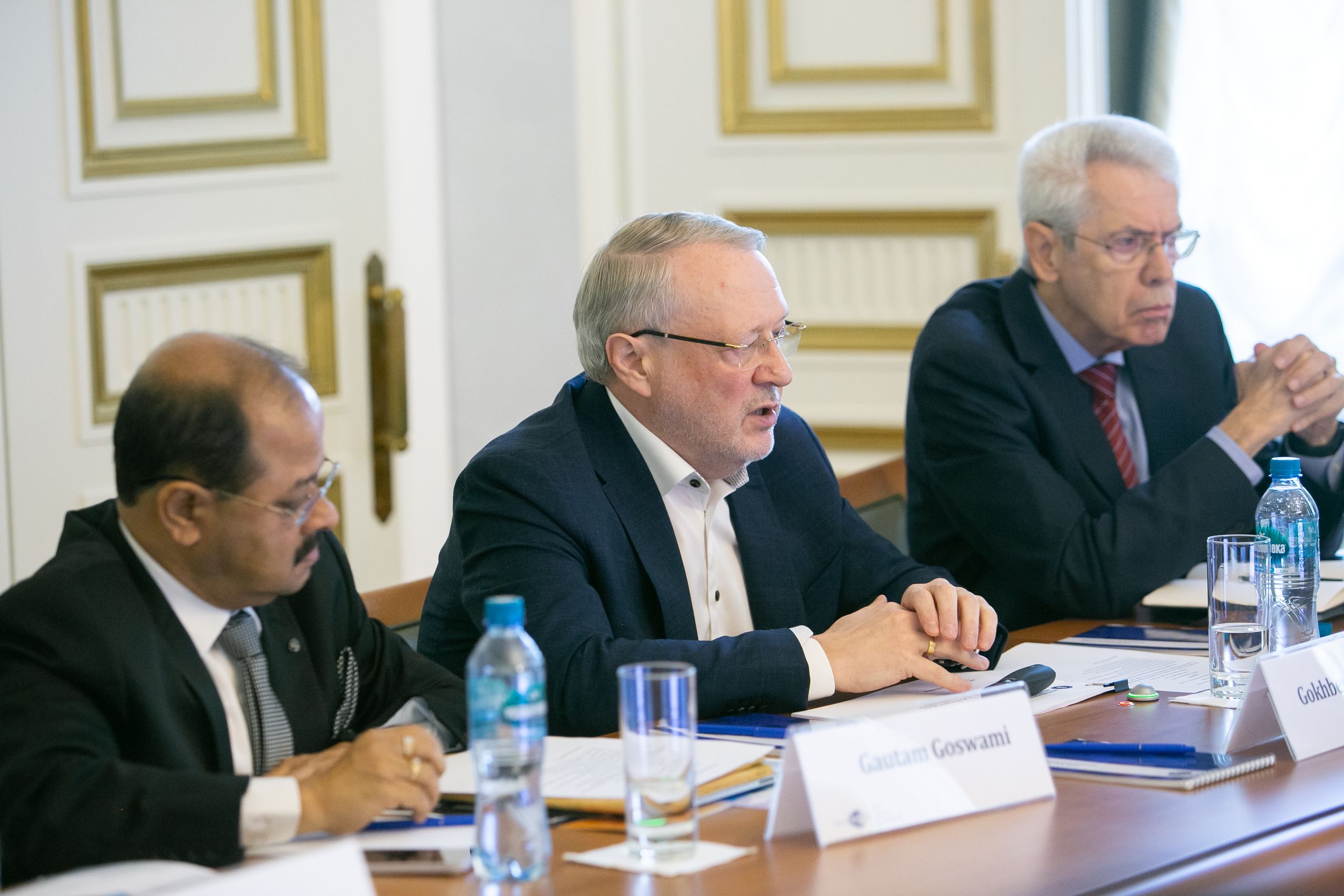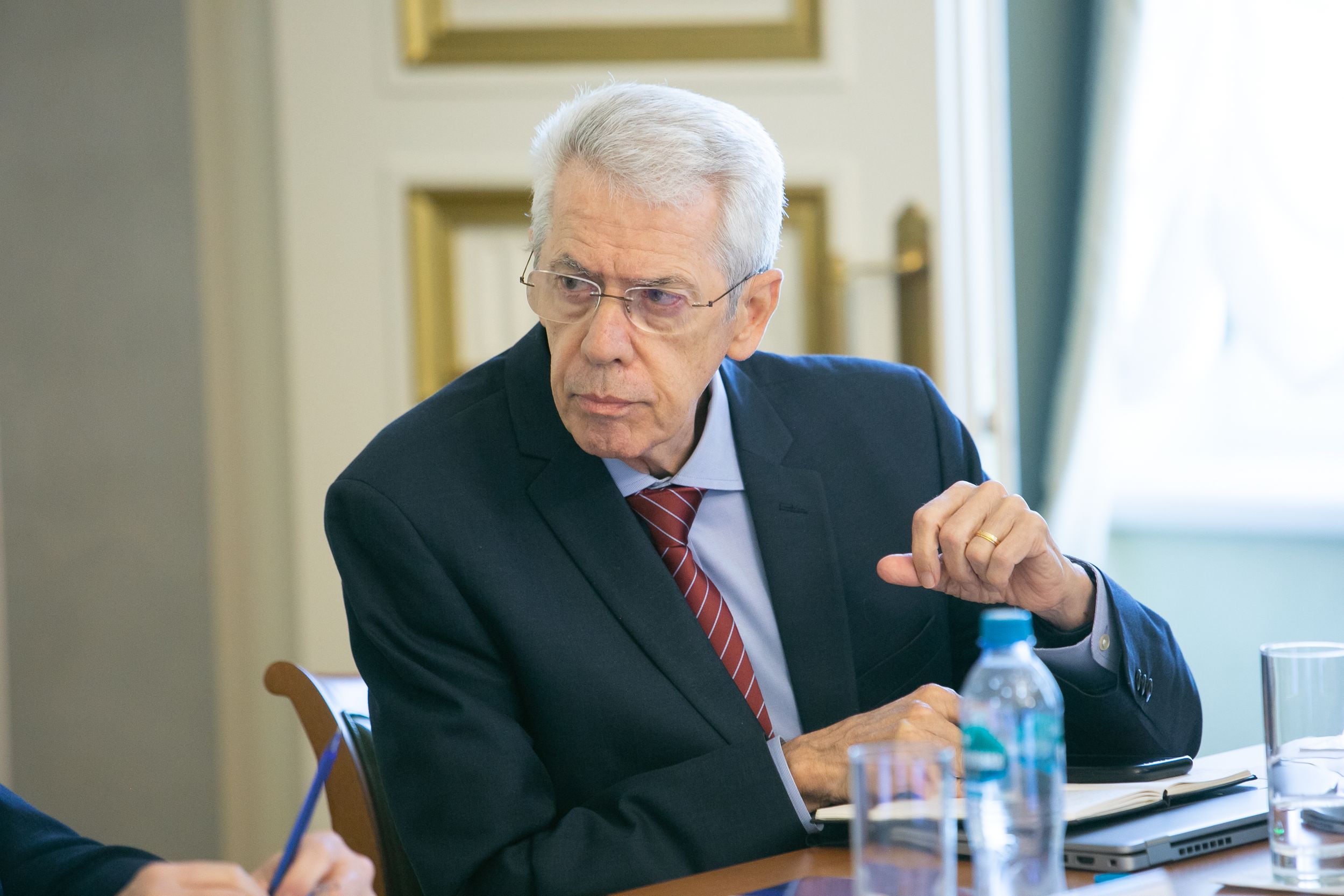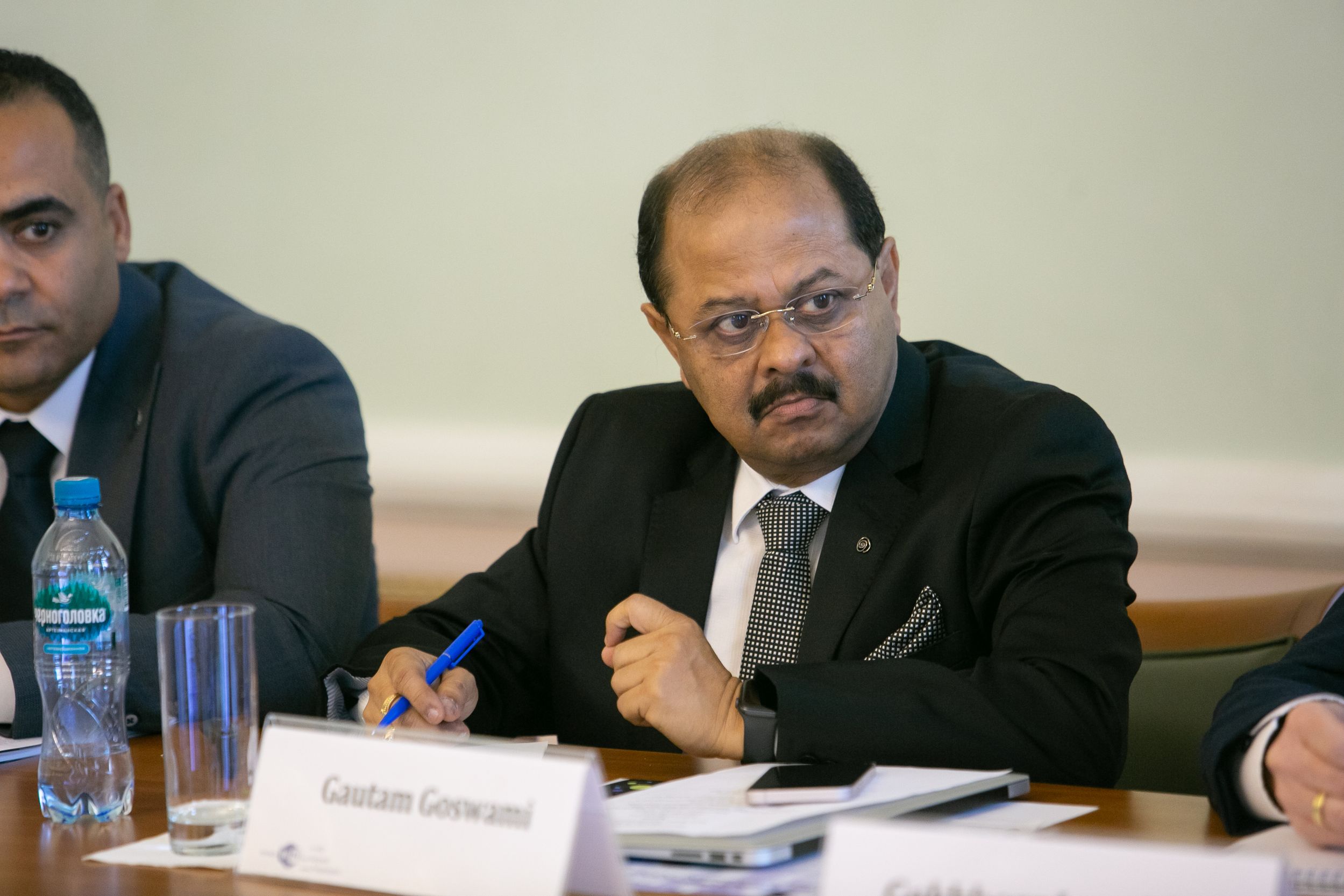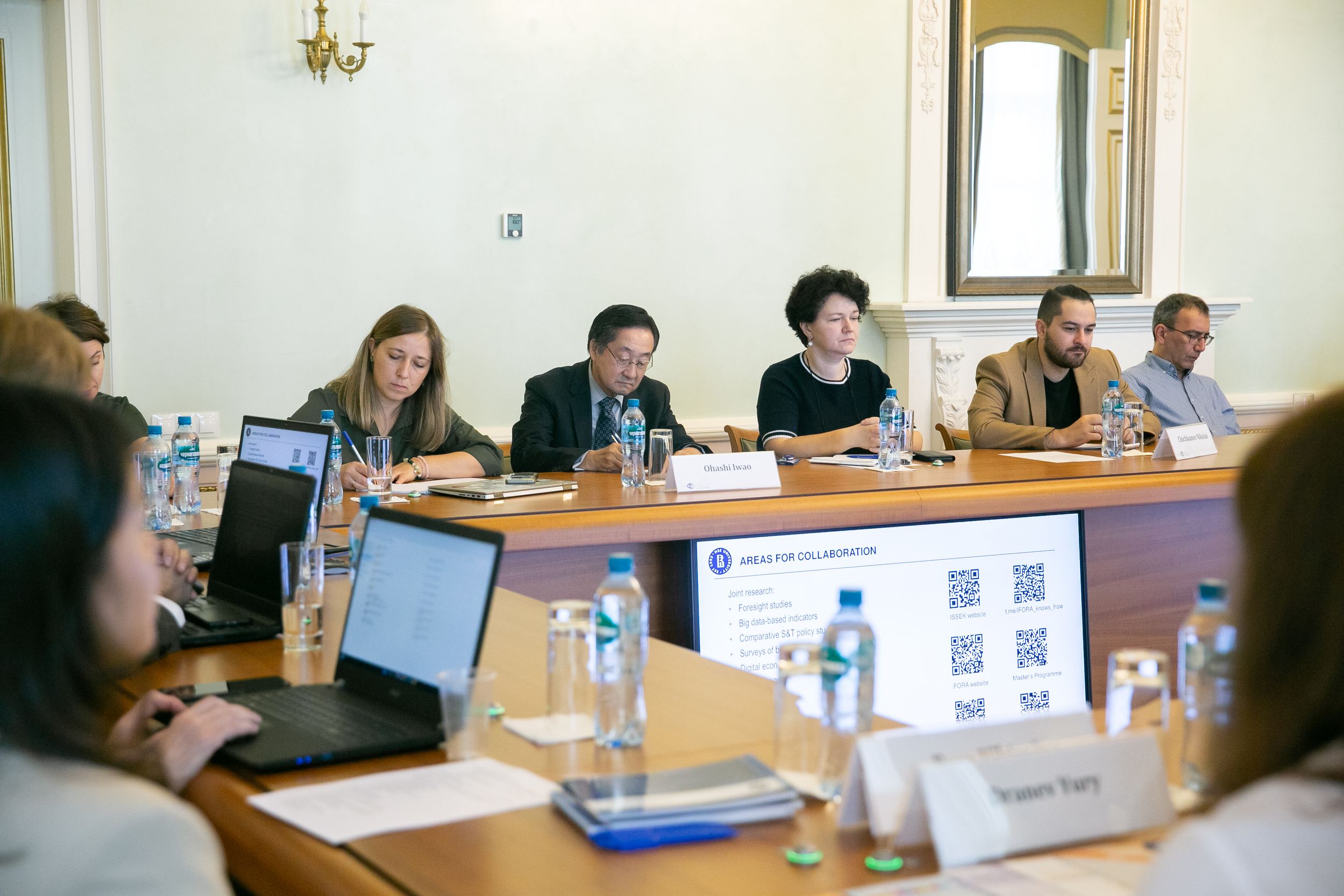‘Geographical Distance No Longer a Problem’: ISSEK Fosters Cooperation with Think Tanks in BRICS Countries
In September, the HSE Institute for Statistical Studies and Economics of Knowledge hosted an international working meeting with representatives from Brazilian, Egyptian, and Indian think tanks. The participants discussed opportunities for cooperation, including joint surveys, comparative studies, databases, and publications on foresight, technology, and innovation. It was also decided to draft a multilateral agreement to establish the BRICS Foresight Association.

Leonid Gokhberg, Director of the HSE Institute for Statistical Studies and Economics of Knowledge (ISSEK), welcomed the participants and presented an overview of research activities carried out at HSE University, including those at ISSEK.
With over 240 staff researchers, ISSEK includes 19 research centres and two international laboratories, making it the largest research unit within HSE University. Key fields of research at ISSEK include science, technology, innovation, digital economy, creative industries, education, and labour market and employment. ISSEK scholars carry out foresight for STI, sustainable economic growth, social welfare, and competitiveness, as well as policy analysis for innovation-driven growth.
ISSEK carries out research projects such as Doing Science in Russia, which analyses the current state of science in Russia and its prospects for development; the Russian Cluster Observatory, which studies cluster policy and offers consultancy; the HSE Global Cities Innovation Index, which analyses over 1000 agglomerations with the largest numbers of high tech and creative leaders from 144 countries; and iFORA, a system of intelligent big data analysis.
Summarising his presentation, Leonid Gokhberg outlined the potential areas for collaboration between ISSEK and its international partners, with joint research, publications and courses in fields such as:
- Foresight studies;
- Big data-based indicators;
- Comparative S&T policy studies;
- Surveys of business climate in S&T;
- Digital economy studies;
- Creative economy research;
- HSE Global Cities Innovation Index.
Leonid Gokhberg also proposed creating a BRICS Foresight Association that would facilitate the cooperation in these areas.

Fernando Rizzo, President of the Centre for Strategic Studies and Management in Science, Technology, and Innovation (CGEE), Brazil, introduced the audience to the history and activities of the Centre. Founded in 2001 and including 115 collaborators, CGEE supports decision-making processes on topics related to science, technology and innovation, through strategic prospecting and evaluation studies. CGEE experts plan, evaluate, and monitor public policies, identify technological opportunities, carry out foresight studies, provide strategic intelligence services for decision making, and offer competency mapping. CGEE includes several research observatories: HR Information Services for Science, Technology and Innovation; Space Technologies Observatory; Science, Technology and Innovation Observatory; Innovation Observatory for Sustainable Cities; Bioeconomy Observatory, and Digital Transformation Observatory.
In 2024, CGEE organised the 5th National Conference on Science, Technology and Innovation, a major event that attracted a total of 30,000 participants across 27 states. At the Conference, the Brazilian Plan for Artificial Intelligence (BPAI) 2024–2028 was launched.

Dr Mohamed Ramadan Rezk, Director of the Egyptian Science, Technology and Innovation Observatory (ESTIO), Egypt, started his presentation with the unexpected idea that foresight had existed as far back as in Ancient Egypt, where stone carvings depicted a future life after death. In its modern understanding, foresight emerged in Egypt in 1975, when Food and Agriculture Organization explored the population outcomes of alternative strategies for development from 1975 to 1985. ESTIO was established in February 2014 as an affiliated tool of the Academy of Scientific Research and Technology (ASRT) in order to focus on STI indicators, conduct future studies, and raise awareness of foresight in Egypt. More recently, in 2021, the North African Applied System Analysis Centre (NAASAC) was established as part of cooperation between ASRT, the International Institute for the Application of Systems Analysis (IIASA) in Austria, and the Institute of National Planning. Its activities include developing an online applied research-oriented degree programme; driving applied research collaborations on challenges relevant to Egyptian, North African, and Arab decision makers; and providing consulting services to governments and businesses. ASRT carries out foresight studies in areas such as energy, water, the impact of COVID-19 on society, and climate change.

Dr Gautam Goswami, Leading Scientist at the Technology Information, Forecasting and Assessment Council (TIFAC), India, discussed the strengths of his organisation. TIFAC is a technology think tank under the Indian Government Department of Science and Technology that monitors future technology trends and outlines technology trajectories for the nation. Governed by a council of eminent experts from government agencies, R&D institutions, academia, and industry, TIFAC prepared Technology Vision 2020 in 1996, Technology Vision 2035 in 1996, and is now working on Technology Vision 2047. The think tank focuses on areas of technology information, technology foresight, technology assessment, technology demonstration, and innovation support. The Council’s experts create the Techno Market Survey Report to track new and emerging technologies; maintain technology and expert databases, and manage patent information. They put together short-term and long-term foresight reports; provide technology needs assessment for meeting India’s climate change targets, and conduct training on foresight for industry professionals, Indian government officials, and academics.

Iwao Ohashi, from Japan, Advisor on Japan and APAC, Industrial Parks of Russia, shared his view on the prospects of Russia’s technological development under sanctions. He believes that Russia should promote cooperation in technology and innovation through its ties with BRICS countries. Joint foresight research is also very important, and Iwao Ohashi suggested that founding a BRICS Foresight Association would be a very promising idea. Mr Ohashi emphasised that China will likely become the real leader in innovation in the nearest future. At the same time, ‘it is also important to create Russian innovation hubs within the country and its regions, and to invite foreign experts to Russia. This is the role of the city, and it should be done strategically’, he said.
After the presentations, scholars from ISSEK exchanged ideas of cooperation with the international participants. Dirk Meissner, Head of the Laboratory for Economics of Innovation and Academic Supervisor of the master’s programme in Science, Technology and Innovation Management and Policy, talked about their cooperation with colleagues from the University of Campinas, Brazil. ‘Geographical distance is no longer a problem,’ he said, emphasising the importance of online communication and learning.
Liliana Proskuryakova, Head of the Laboratory for Science and Technology Studies, noted that among the possible areas for joint research, many participants mentioned basic needs such as energy, water, and health, and suggested that these could be potential priorities for cooperation. Mikhail Gershman, Director of the Centre for Science, Technology, Innovation and Information Policy, who is responsible for Doing Science in Russia survey, invited colleagues to join forces in comparative cross-country studies on science environment and science-related policies. Ekaterina Streltsova, Director of the Centre for Statistics and Monitoring of S&T and Innovation, proposed cooperation on patent analysis and methodological approaches to technology assessment.
Evgeniy Kutsenko, Director of the Russian Cluster Observatory, explained their research agenda, which includes cluster excellence, unicorn companies, and creative industries. Mariia Antasheva, Expert at ISSEK Data Analysis Unit, presented iFORA, a big data mining system developed at ISSEK.

Fernando Rizzo, President of the Centre for Strategic Studies and Management in Science, Technology, and Innovation (CGEE), Brazil
‘I’m really glad that I was able to come to this meeting. CGEE started cooperating with HSE University many years ago, and when Alexander Sokolov contacted me and suggested to reconnect, most people at CGEE, who had already experienced cooperation with HSE, were very happy with the possibility, as they understand the quality and the top level of people at HSE University.
At CGEE, we work in several different areas, including sustainable cities, bioeconomy, energy, airspace, agriculture, and education. Some of the potential areas for our international collaboration include training and education in AI and data science, using generative AI for research and innovation, collaborative data infrastructure, and applying predictive modelling in big data analysis.’
The participants agreed to promote international friendship and initiate cooperation in the areas discussed at the meeting. Leonid Gokhberg also suggested that ISSEK drafts a multilateral agreement to establish the BRICS Foresight Association.
See also:
‘Cities Are Key Actors of Interaction in the Global Arena’
The HSE Faculty of Urban and Regional Development (FURD) and India’s leading research centre, the Observer Research Foundation (ORF), have agreed to strengthen their partnership comprehensively in the study and analysis of urban development across BRICS countries. In addition, students and experts from Russia and India will take part in joint academic events and research projects.
HSE University Holds HSE CS × BRICS Ideathon
On November 9, 2025, the HSE CS × BRICS Ideathon—a large-scale intensive event for students aimed at developing international project skills and finding solutions to current challenges facing BRICS countries—took place at HSE University’s Pokrovsky Bulvar campus. The event was organised by the Multilateral Strategic Projects Office with the support of the BRICS Expert Council–Russia , the Faculty of Computer Science (FCS), and the HSE FCS Hackathon Club
‘To Help Make the World More Sustainable, Fair, and Humane’
The BRICS International School: New Generation has concluded at HSE University, bringing together more than 100 participants from 38 BRICS and Global South countries. The attendees included early-career researchers, diplomats, entrepreneurs, journalists, and civil society representatives.
'We Are Not Trying to Guess the Future—We Are Creating It': HSE University Experts Discuss 21st-Century Trends and Scenarios
Experts from HSE University participated in the II International Symposium 'Inventing the Future.' During the panel discussion 'Horizons of the Future: Trends, Challenges, and Scenarios,' organised by the HSE Institute for Statistical Studies and Economics of Knowledge (ISSEK), researchers explored the role of foresight and big data analysis in shaping visions of the future and identifying global megatrends that will drive the world’s development in the coming decades.
‘Regulators Must Understand That Absolute Predictability is Unattainable’
On October 10–11, 2025, the BRICS Competition Law and Policy Centre at HSE University (the BRICS Centre) hosted a two-day international seminar, ‘Platform Economy: Competition Law and the Market Power of Digital Platforms,’ in Tashkent, Uzbekistan. The event brought together competition authorities from BRICS+ nations and leading antitrust experts from around the world.
Achieving Financial Independence: Experts Discuss Development of BRICS National Currency Settlements
How can BRICS countries move away from the dollar in international settlements, and what can they do to advance this goal today? These questions were discussed by experts during a round table at HSE University. The event was organised by the Multilateral Strategic Projects Office together with the HSE Faculty of World Economy and International Affairs as part of HSE’s activities within the BRICS Network University and the Joint Basic Research Projects ‘International Academic Cooperation of HSE University.’
Global AI Trends Discussed at International Foresight Workshop at HSE University
At an international foresight workshop on artificial intelligence held at HSE University, Russian and foreign scholars discussed the trends and challenges arising from the rapid development of AI.
Experts from HSE University and BRICS Anti-Monopoly Authorities Analyse Global Grain Market
The International BRICS Competition Law and Policy Centre at HSE University presented the scientific report ‘From Fields to Futures: Competition, Financialisation, and Digitalisation in Global Grain Value Chains.’ The document was prepared as part of expert support from the BRICS Working Group on Competition Research in Food Markets. The presentation took place at the academic conference ‘Emerging Challenges of Competition Law and Policy in the BRICS and Beyond’ on September 12, 2025, in Cape Town (South Africa), which the BRICS Centre organised together with the University of Cape Town on the sidelines of the 9th BRICS International Competition Conference.
HSE Launches Training for Future BRICS Experts
From August 20–23, 2025, the Artek International Children’s Centre (Crimea, Russia) hosted an off-site session of HSE University’s educational and outreach project BRICS International School: New Generation. The school was the first event to take place under the cooperation agreement signed this year between HSE University and Artek.
HSE University and University of Campinas Join Forces to Build Alternative Financial System
HSE University and the University of Campinas (UNICAMP, Brazil) have announced the launch of a major joint research project to develop new approaches to an alternative international financial system. The initiative, which brings together leading experts in global economics and finance, seeks to analyse the current state of international financial architecture and explore ways of transforming it in the context of a changing geopolitical landscape.


